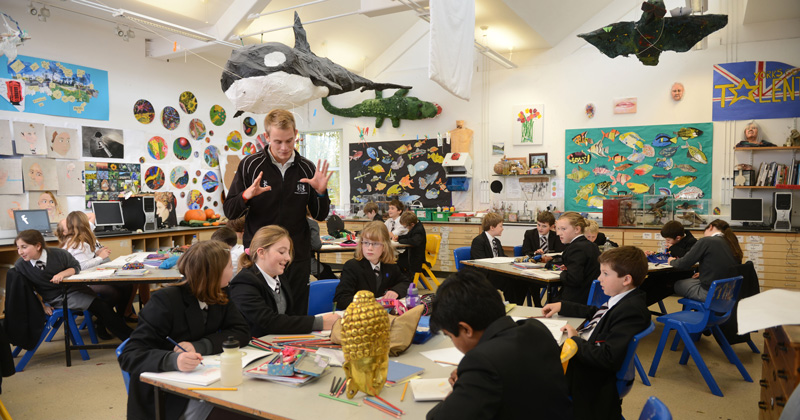Ofsted has warned against art and design curriculums that are a “mile high and an inch deep”, and said fears that not enough time is given to the subjects are “not unwarranted”.
The watchdog has published its latest curriculum research review on art and design education in schools.
It sets out some of the key-principles Ofsted has identified of teaching a “high-quality” art curriculum. It is the eleventh such review to have been published.
Chief inspector Amanda Spielman said she hoped it would “contribute to raising the quality of art education for all young people.
“A high-quality curriculum in art, craft and design, enables pupils to develop love of a subject that is both intellectually challenging and creatively demanding.”
Here’s what we learned…
1. Sufficient time needs to be given to art
The review said leaders who wanted to develop ambitious art curriculums “need to consider whether they have allowed enough time for the subject”.
This is important if pupils are to meet the high-level outcomes of the national curriculum.
Previous research found a majority of primary teachers think there is an “insufficient emphasis” on the arts.
Ofsted added that in secondary, an art curriculum that “significantly limits” the amount of time given to the subject at key stage 3 “is unlikely to benefit pupils”.
“Concerns about the amount of curriculum time given to art, craft and design are not unwarranted,” it said.
2. Curriculum should not cover all areas of ‘making’
The subject covers several different areas of ‘making’, including drawing, painting, sculpture and photography.
But Ofsted warned curriculums were unlikely to be able to cover all areas of making in sufficient depth “for pupils to engage meaningfully with them”.
Subject leaders and curriculum designers therefore need to choose which areas to include, and should have a “sound rationale” for why the combination they choose is cumulatively sufficient.
This then prevents the curriculum from “collapsing into a superficial tour of different areas of making”.
Ofsted warned pupils would not be able to engage “meaningfully in each tradition if the curriculum is a ‘mile wide and an inch deep'”.
Pupils should instead be taught different “content, methods and techniques” from the covered areas of making.
3. Don’t lower expectations for SEND pupils
Ofsted said it would be “inappropriate” to adopt a single approach for all pupils with special educational needs and disabilities (SEND).
But it added the art curriculum should be ambitious for all pupils.
“Sometimes, teachers unnecessarily lower their expectations for pupils with SEND,” it said.
Schools are advised to adapt parts of the art curriculum, rather than removing them for pupils with complex needs.
Ways in which curriculums can be adapted include providing alternative, quieter spaces for pupils with specific sensory needs.
4. Practice must be ‘built in’ to the curriculum
The review said it was important that leaders and planners recognised that practice needs to be “built in to the curriculum”.
“Sequencing for practice” occurs when subject leaders give pupils enough regular opportunities to work with related content to help them learn the content in the longer term.
It is also the process of thinking through how to support pupils’ learning by breaking down the main components they need to practise.
For example, teaching pupils how to use watercolours would be broken down into parts. This could involve practising adding and removing washes and glaze with one type of tool and then trying a range of tools.
Links should then be highlighted between practical knowledge, theoretical knowledge and disciplinary knowledge. “This enables pupils to become knowledgeable about art,” the review said.
5. Disciplinary and theoretical knowledge as important as practice
In the review, Ofsted broke down the knowledge pupils needed to learn into three areas: practical, theoretical and disciplinary.
Previous research, it said, had highlighted that art education often focused on practical skills, sometimes at the expense of theoretical knowledge.
But when pupils learn theoretical knowledge – which enables pupils to draw connections between art’s part, present and future – they learn about themes and diverse connections that have existed over time.
“If teachers do not contextualise art, craft and design traditions, pupils can build profound misconceptions about the ways that humans make and understand art,” it stated.
Disciplinary knowledge is where pupils learn how art is studied, discussed and judged.
Ofsted said this was important as it “enables pupils to see how (what might appear to be) contradictory ideas can co-exist and be connected within the traditions of art.”
6. Don’t conflate what pupils need to know with what they create
Leaders have been told that when setting “ambitious end goals” for the curriculum, “it is important that they do not confuse the content pupils need to know with the artwork that they create”.
While the curriculum sets out what pupils need to know, it might not specify ways for them to use the knowledge.
Schools are advised to “think carefully” about which end points of the curriculum need to be convergent – where the outcome is prescribed – and which need to be divergent – where it is not known how pupils will use their knowledge.
“High-quality art and design curriculums identify pertinent and useful knowledge that pupils need in order to make or view particular kinds of art,” it said.
















Your thoughts